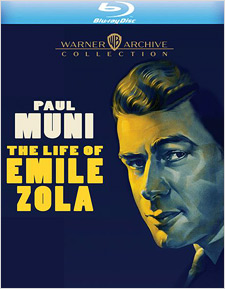Life of Emile Zola, The (Blu-ray Review)

Director
William DieterleRelease Date(s)
1937 (August 29, 2023)Studio(s)
Warner Bros. Pictures (Warner Archive Collection)- Film/Program Grade: B-
- Video Grade: B+
- Audio Grade: B+
- Extras Grade: A-
Review
Some movies don’t age well. Case in point, the 1937 Academy Award-winner for Best Picture, The Life of Emile Zola. Nominated for 10 Oscars and winner of three, the influential biopic, along with The Story of Louis Pasteur, became a template for such films glutting the market over the next several years. But the picture approaches its subject simplistically, sidestepping matters essential to fully understanding its story. Further, star Paul Muni is hammy as Émile Zola (1840-1902), the French novelist of the naturalism school.
The film opens with struggling writer Zola and struggling painter Paul Cézanne (Vladimir Sokoloff) struggling to pay the rent of their drafty attic apartment. (Clumsy foreshadowing has Zola sealing off all the fresh winter air.) Cézanne has an epiphany, that Zola should rebel against the current wave of featherweight French literature then in vogue with stories exposing THE TRUTH about Paris’s underbelly, its mistreatment of the working class, and corruption in its military.
Pretty soon Zola is a wealth, if controversial figure, living like a king with wife Alexadrine (Gloria Holden of Dracula’s Daughter). After many years Cézanne shows up for dinner, warning Zola that he’s grown fat and complacent, his fantastic wealth putting him out of touch with ordinary Parisians. Fortunately for Zola, the case of a lifetime, again rooted in rooting out THE TRUTH is at hand.
When a spy is discovered within the French general staff, its highest-ranking officers decide to make a scapegoat out of Capt. Alfred Dreyfuss (Joseph Schildkraut), court-martialing and sentencing him to Devil’s Island. Even after Chief of Intelligence Col. Picquart (Henry O’Neill) uncovers evidence that infantry officer Maj. Walsin-Esterhazy (Robert Barrat) is the real spy, his superiors order a coverup to protect the “infallibility” of the military and to save their own necks.
Dreyfuss’s unwaveringly loyal wife, Lucie (Gale Sondergaard), appeals to Zola to take up her husband’s case, and so he does, publishing an open letter entitled J’accuse certain to incite a criminal libel lawsuit from the government.
The Life of Emile Zola has some good points but the 116-minute film—unusually long for a 1937 release—has virtually nothing to offer in terms of dramatizing Zola’s importance as a writer, what drove him to write the novels he did, their content, or the naturalism movement he all but founded. Instead, the movie audience sees an animated montage of Zola titles with plain-wrap dust jackets that don’t even hint at their content, added one-by-one to a kind of carousel bookshelf. Indeed, according to the film, it’s as if Cézanne’s offhand suggestion to write THE TRUTH was all Zola needed to hit the ground running. In one scene he’s pitifully dressed, dripping wet under a broken umbrella, and in the next stuffing his pie-hole with extravagant lobster dinners.
Like the film, star Paul Muni was widely respected throughout the 1930s, perhaps second only to John Barrymore among American actors, famous for his chameleon-like film roles. Unlike Barrymore, however, Muni hasn’t aged well any more than The Life of Emile Zola. Even in classics like Scarface and I Am a Fugitive from a Chain Gang, to me Muni always seemed over-the-top hammy, playing to back of the theater, as if the Yiddish Theater and Broadway star never really learned how to play to the much more intimate medium of film.
The other BIG problem with The Life of Emile Zola is that it completely sidesteps the entire basis of Dreyfuss’s wrongful conviction: rampant anti-Semitism. Indeed, the anti-Semitism movement in Paris at the turn of the 20th century easily rivaled that of Nazi Germany 35 years later, the pervasiveness and intensity of which can be seen in the recent French-made television series Paris Police 1900, which covers much the same period far more authentically than this film does.
Though Warner Bros. would soon begin making explicitly anti-Nazi films with Confessions of a Nazi Spy two years later, the studio really wimped out on Zola, not wanting to risk the picture getting banned in Germany or, for that matter, in France. The anti-Semitic basis of the Dreyfuss is completely absent. The word “Jew” is never spoken, and the word appears in text form once, briefly-glimpsed (about half a second) in a dossier on Dreyfuss: Religion: Jew.
On the plus side, the recreations (by art director Anton Grot) of late-19th century and early-20th century Paris are splendid and frequently quite lavish, especially the trial scenes, an enormous set taking up an entire soundstage and populated by hundreds of costumed extras. Many of the supporting actors are good, and Max Steiner’s musical score is fine.
Warner Archive’s Blu-ray of The Life of Emile Zola is billed as a “4K restoration from the original [nitrate] camera negative” but that seems only partially true. The first reel, running about 10 minutes, lacks the sharpness and clarity of what follows, which is in very good but not excellent condition, at least to my eyes. The DTS-HD Master Audio (mono) is also a little tinny here and there; I resorted to the optional English subtitles here and there to catch some of the dialogue.
The short Alibi Mark (1937) was announced as an extra in early press releases, but this seems to have been replaced with the two-reel Joe Palooka short Taking the Count (also 1937), featuring Shemp Howard as Knobby Walsh. Also included is the musical short Mal Hallett and His Orchestra, a Lux Radio Theater broadcast adaptation from 5/8/39 (audio only), and a trailer.
Though The Life of Emile Zola should be seen by serious cinephiles, it’s most definitely not the same class of acclaimed classical Hollywood movies like Casablanca, Citizen Kane, and The Maltese Falcon, pictures one eagerly watches over-and-over. A one-time viewing will more than suffice.
- Stuart Galbraith IV

